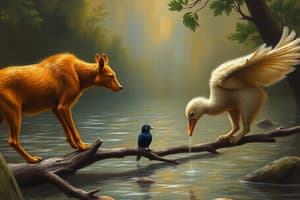Podcast
Questions and Answers
What does the study of Animal Physiology focus on?
What does the study of Animal Physiology focus on?
- The functions and processes of animal bodies (correct)
- The classification of animals based on similarities
- The interaction of animals with their environment
- The origins and changes in animal species
Which subfield of zoology investigates animal interactions?
Which subfield of zoology investigates animal interactions?
- Evolutionary Biology
- Conservation Biology
- Animal Behavior (Ethology) (correct)
- Taxonomy
What hierarchical system is used for the classification of animals?
What hierarchical system is used for the classification of animals?
- Domain, Kingdom, Class, Order, Family, Genus, Species
- Phylum, Class, Order, Family, Genus, Domain, Kingdom
- Kingdom, Phylum, Class, Order, Family, Genus, Species (correct)
- Species, Genus, Family, Order, Class, Kingdom, Domain
What aspect of zoology studies how animals adapt to their environments?
What aspect of zoology studies how animals adapt to their environments?
Which major group of animals is characterized by having a backbone?
Which major group of animals is characterized by having a backbone?
What is the focus of Conservation Biology?
What is the focus of Conservation Biology?
Which method of study involves observational research in natural settings?
Which method of study involves observational research in natural settings?
What recent trend in zoology focuses on the impact of environmental changes?
What recent trend in zoology focuses on the impact of environmental changes?
Flashcards are hidden until you start studying
Study Notes
Overview of Zoology
- Zoology is the scientific study of animals, encompassing various aspects of their biology, behavior, and interactions with the environment.
Subfields of Zoology
- Animal Physiology: Study of the functions and processes of animal bodies.
- Animal Behavior (Ethology): Investigation of how animals interact with each other and their environment.
- Taxonomy: Classification of animals into groups based on similarities and differences.
- Ecology: Study of animal interactions with their surroundings and other living organisms.
- Evolutionary Biology: Examines the origins and changes in animal species over time.
- Conservation Biology: Focuses on protecting endangered species and habitats.
Major Concepts
- Classification of Animals: Hierarchical system (Domain, Kingdom, Phylum, Class, Order, Family, Genus, Species).
- Anatomy and Morphology: Study of animal structure and form.
- Reproduction: Strategies include sexual and asexual reproduction, with variations among species.
- Development: Study of embryonic development and life cycles (e.g., metamorphosis).
- Adaptation: How animals adjust to their environments for survival (morphological, physiological, behavioral).
Key Animal Groups
- Invertebrates: Lack a backbone; includes phyla like Arthropoda, Mollusca, and Annelida.
- Vertebrates: Have a backbone; includes classes like Mammalia, Aves, Reptilia, Amphibia, and Actinopterygii (fish).
Importance of Zoology
- Understanding biodiversity and the role of animals in ecosystems.
- Contribution to medical and biological research.
- Conservation efforts to preserve wildlife and natural habitats.
Methods of Study
- Field studies: Observational research in natural habitats.
- Laboratory studies: Controlled experiments to understand specific phenomena.
- Molecular techniques: Genetic analysis to explore relationships among species.
Recent Trends
- Increasing focus on conservation and protecting biodiversity.
- Integration of technology in research (e.g., genetic sequencing, bioinformatics).
- Study of the impact of climate change on animal populations and behavior.
Overview of Zoology
- Zoology investigates the diverse world of animals, exploring their biology, behavior, and interactions with their surroundings.
Subfields of Zoology
- Animal Physiology focuses on the inner workings of animal bodies, exploring their functions and processes.
- Animal Behavior (Ethology) delves into how animals communicate, cooperate, and navigate in a complex world.
- Taxonomy organizes animals into groups based on their shared characteristics, creating a system of classification.
- Ecology examines how animals interact with their environment and other living organisms, revealing intricate relationships.
- Evolutionary Biology investigates the origins and changes in animals over time, shedding light on their history.
- Conservation Biology focuses on protecting endangered species and habitats, addressing the critical issue of preserving biodiversity.
Major Concepts
- Classification of Animals: A hierarchical system, starting from broad categories like Domain and Kingdom, to increasingly specific levels like Phylum, Class, Order, Family, Genus, and Species.
- Anatomy and Morphology: Examining the structure and form of animals, revealing adaptations for survival.
- Reproduction: Diverse strategies involve sexual (involving genetic exchange) and asexual (without genetic contribution from another individual) reproduction, tailored to different species' needs.
- Development: Tracking the changes from embryo to adult form, including processes like metamorphosis, that illustrate developmental pathways.
- Adaptation: How animals evolve physical, physiological, and behavioral traits that enable them to survive in their specific environments.
Key Animal Groups
- Invertebrates, comprising a vast majority of animal species, lack a backbone. Examples include Arthropoda (insects, crustaceans), Mollusca (snails, squids), and Annelida (worms).
- Vertebrates, possessing a backbone, include classes such as Mammalia (mammals), Aves (birds), Reptilia (reptiles), Amphibia (amphibians), and Actinopterygii (fish).
Importance of Zoology
- Offers crucial insights into biodiversity, understanding the intricate web of life and the roles animals play in ecosystems.
- Provides insights for medical research, benefiting human health through the study of animal models.
- Fuels conservation efforts to protect endangered species and habitats, ensuring the preservation of biodiversity.
Methods of Study
- Field studies: Observational research directly in natural habitats, providing real-world data on animal behavior and interactions.
- Laboratory studies: Controlled experiments in controlled environments, enabling precise measurements and manipulation of variables.
- Molecular techniques: Utilizing genetic analysis to explore evolutionary relationships among species and delve into the molecular mechanisms underlying their adaptations.
Recent Trends
- Growing focus on conservation initiatives, driven by the increasing threats to biodiversity.
- Integration of technology in research, employing advanced tools like genetic sequencing and bioinformatics to unravel complex biological questions.
- Investigating the impact of climate change on animal populations and behavior, highlighting the crucial role of understanding its effects.
Studying That Suits You
Use AI to generate personalized quizzes and flashcards to suit your learning preferences.




